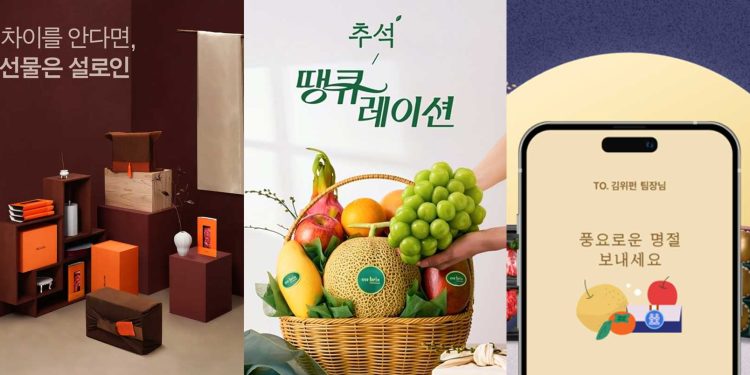The Chuseok holiday season has become more than a cultural tradition in South Korea. Because now, it has become a proving ground for startup innovation. As consumer expectations shift toward sustainability and premium convenience, early-stage companies are transforming this annual holiday into a live test environment for scalable business models, logistics innovation, and digital gifting services that could define Korea’s next wave of global consumer exports.
Startups Redefine Chuseok Holiday Gift Market with Innovation and Strategy
Korean startups are reshaping the traditional Chuseok gift market by turning it into a strategic platform for innovation, brand experimentation, and cross-border scalability.
Once dominated by conglomerates, the 2025 Chuseok holiday season marks a visible shift toward premium quality, eco-conscious solutions, and personalized consumer experiences driven by emerging startups.
Companies like Sir.Loin, Onbrix, CaretStore, Wefun, and SodaCrew are not only capitalizing on seasonal demand but also testing new business models that could strengthen Korea’s position in the global consumer-tech and lifestyle export market.
Startup-Driven Shift: Quality, Sustainability, and Convenience
Premium beef brand Sir.Loin introduced luxury Hanwoo gift sets powered by its proprietary aging technology and delivery concierge system. Its approach centers on quality consistency—managing every process from sourcing and aging to logistics.
CEO Byun Jun-won emphasized that “good meat must guarantee consistent quality,” highlighting how Sir.Loin’s method ensures identical taste and texture across all deliveries.
Its triple-insulated packaging and freshness-controlled delivery system extend product shelf life beyond two weeks, positioning Sir.Loin as a model for how traditional industries can adopt tech-integrated food logistics.
Meanwhile, Onbrix, a startup founded by former Hyundai Department Store buyer Heo Jae-sung, is elevating Korea’s fruit gifting market.
By applying direct sourcing, in-house logistics, and destructive sweetness testing, Onbrix delivers department store-grade fruit online with same-day or dawn delivery. The company’s business model reflects how data-driven quality verification and shortened cold-chain distribution can redefine consumer trust.
Green and Global: From Packaging to Cross-Border Gifting
Packaging startup CaretStore is targeting B2B clients with eco-friendly packaging solutions such as tape-free boxes, paper-based cushions, and biodegradable fillers.
Its business aligns with the government’s August 2025 update to agricultural product packaging regulations, which now include sustainability standards—an important signal of policy alignment between startups and national green transition goals.
Employee welfare platform Wefun has entered the corporate gifting segment through its “Gift 24” service, combining early promotions and tailored pricing strategies for bulk enterprise orders.
At the same time, SodaCrew enables overseas Chuseok gifting through its global delivery network, “SodaGift” connecting Koreans abroad with their families through curated meal and gift sets—a reflection of Korea’s rising role in cross-border digital gifting platforms.
The Chuseok Holiday Market 2025: Consumer Innovation as Export Strategy
Beyond its seasonal business opportunity, the shift in the Chuseok holiday market acrually shows how Korean startups are using cultural and retail cycles as testbeds for product innovation, logistics efficiency, and sustainability models.
The convergence of premium quality assurance, eco-packaging, and digital gifting offers export-ready frameworks for global consumer markets, especially across Asia and the Middle East where Korean lifestyle products continue to gain influence.
From AI-integrated logistics systems to eco-design and direct-to-consumer platforms, the startups’ efforts illustrate Korea’s evolving SME innovation strategy—linking domestic consumption patterns to international scalability.
E-commerce leaders like Kurly and Wadiz are reinforcing this direction by expanding curated Chuseok sets and restaurant-linked preorders, signaling that traditional holidays are becoming live laboratories for scalable innovation models.
Korean Startups’ Testbed for Culture, Innovation, and Global Readiness
Finally, Korea’s Chuseok holiday season in 2025 stands as a microcosm of the country’s next startup growth phase—where culture meets commerce, and domestic innovation meets global readiness.
As founders harness the season to refine logistics, sustainability, and brand strategy, Korea is proving that even its most traditional markets can evolve into launchpads for globally scalable consumer innovation.
– Stay Ahead in Korea’s Startup Scene –
Get real-time insights, funding updates, and policy shifts shaping Korea’s innovation ecosystem.
➡️ Follow KoreaTechDesk on LinkedIn, X (Twitter), Threads, Bluesky, Telegram, Facebook, and WhatsApp Channel.





